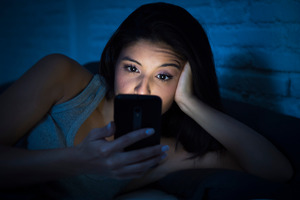
When you have sleep apnea, your brain may repeatedly force your body to wake up throughout the night due to pauses in your breathing. Needless to say, this can make getting a good night’s rest extremely difficult. But did you realize that your phone could be making the problem even worse? Below is a quick look at why using your phone right before bed is one of the last things you want to do when you’re already struggling with sleep apnea.
How Your Phone Can Affect Your Sleep
You may have heard that electronic screens, such as the one on your phone, give off blue light. This is a special type of light that your brain can mistake for light from the sun. In other words, looking at your phone right before bed can make your body think it’s still daytime. As such, the production of melatonin – a hormone that plays an important role in regulating the sleep cycle – is suppressed, making it more difficult to fall and stay asleep.
On their own, late-night cell phone use and sleep apnea can both have a negative impact on the quality of your sleep. As such, combining the two can make your nights even less restful.
What Can You Do About Blue Light?
In order to prevent blue light from interfering with your sleep, it is highly recommended that you avoid using your phone – or any other type of electronic device with a screen – for at least one hour before you go to bed. It’s a good idea to look for alternative ways to pass the time in the evening, such as reading a book.
How Can You Treat Sleep Apnea?
When it comes to sleep apnea, it’s important to have the disorder diagnosed and treated as soon as possible. A sleep test will need to be performed in order to confirm that sleep apnea is truly present; once the diagnosis has been made, you can start searching for a suitable solution.
Traditionally, sleep apnea is treated with a CPAP machine. However, some patients may have the option of using a customized oral appliance instead. An oral appliance is designed to help keep your airway open, thus preventing the obstructions that can interrupt your breathing.
Whether it involves giving up nighttime cell phone usage or having your sleep apnea treated, it’s important to be proactive about addressing any obstacles that are standing between you and a good night’s slumber.
About the Author
Dr. Katherine Parét is a graduate of the Tufts University School of Dental Medicine. During her residency at the VA Medical Center in Charleston, SC, she made her first TAP appliance for treating sleep apnea. Her South Portland practice, Mind Your Mouth, offers ProSomnus and SomnoMed oral appliances for patients with sleep-disordered breathing. To schedule a consultation with Dr. Parét, visit her website or call (207) 200-4106.

